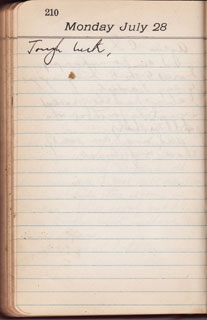
Tough luck,
—————–
Matt’s Notes
Since we know how full and satisfying Papa’s life was in the end, we know he would eventually master the feelings of loneliness and displacement and sadness he felt so often when he wrote his 1924 diary. His capacity for joy and optimism and contentment, the signs of which we also see clearly in many of his entries, would win out and define him for those who knew him later.
We know, too, that this diary, with its details about his father’s death, is in part a long study of how he mastered the attendant feelings of (in his own words) “lost Paradise,” the final loss of his youth, and the understanding that he couldn’t go home again. Somewhere between its lines lie the clues as to how a young man like Papa — forced by circumstance from his native country, faced with the pressure of supporting his family back home, compelled to help support his sisters’ families in New York, depressed by the contrast between his idealistic image of how he wants his life to be and how it really is, and later faced with the suicide of his sister, the extermination of his European family by Nazis, and countless other trials — could become so whole and generous when he had every right to be embittered and selfish.
But still, even though we know 1924 was a year of tremendous change for Papa, even though we know the wisdom he acquired through his trials was essential to the evolution of his character, his diary is not a novel and does not have neat, clean turning points or moments of sudden revelation. He still had to live each day of the year, and he still had to go through long periods when his true character failed him and his sadness became bottomless, when he felt so helpless in the face of circumstance that he could sit down with pen in hand and, unable to see into the future, find nothing to say except “tough luck.”